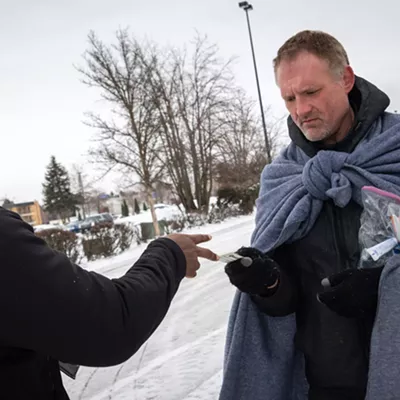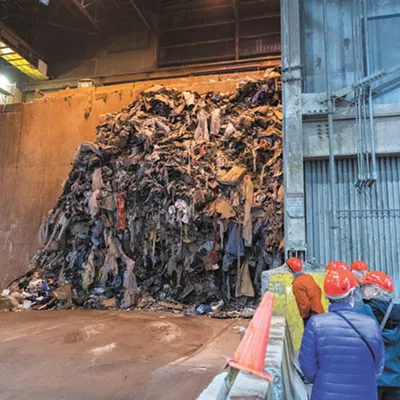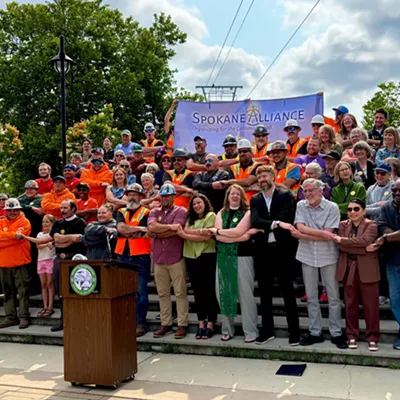
When property assessments were mailed to Spokane County homeowners earlier this month, the average home was valued a whopping 31 percent higher than the year before. It's a record-breaking jump in value. For many, it's also a source of concern.
Spokane County Assessor Tom Konis says the phone calls to his office after this year's assessments went out were "very, very heated." Things have since cooled down a bit. For Konis and many homeowners, the massive increase was a lot to process. Konis says he was "scared to death" when he saw the final numbers.
Konis has been working in the Assessor's Office for almost 30 years. When he started the job in the early '90s, year-to-year changes in property values generally stayed in the lower single digits. There have been a few outlier years, like 1993, which saw a 26 percent increase because of a moratorium lifting. The percent change in average value dipped into the negative for a few years following the 2008 crash. The percent change in value was 11.5 percent last year.
This year, the average home has an assessed value of $418,800, compared with $320,900 last year. And among high-end properties, some increases are hitting $500,000 above last year's assessments. This rise in values is dramatic, but Konis says he wasn't surprised. Spokane's crazy-hot housing market has been in the spotlight for a while now.
Each year, the county Assessor's Office sends out dozens of appraisers to physically inspect one-sixth of the county properties. The inspections are done from the street and usually take three to four minutes per home, Konis says. Appraisers will take pictures and make notes about the home and any new additions that might affect the value. Back at the office, they'll figure out the exact value and apply it to similar properties in the neighborhood.
Because the assessments are done entirely from the street, it's possible for them to miss things on the inside that might change the value. If a homeowner feels the assessment is inaccurate, they can file an appeal with the Spokane County Board of Equalization.
While some homeowners are happy to see their equity rise, other's have a more immediate question: What will this do to my taxes?
"That's what everyone wants to know," Konis says. "If it was just raising assessed values, it's no big deal. But there's some monetary consequence to it."
TAXES ARE COMPLICATED
Home assessments help determine how much people pay in property taxes. Like all things tax-related, it can get contentious.
"I had a big argument with my mother-in-law on Father's Day because of that," Konis laughs, "because she kept saying I raised their taxes 30 percent."
Konis stresses that a 31 percent increase in home assessments does not translate to a 31 percent increase in property taxes. It's a common misconception, he says. Konis has tried to get the word out and help calm people's nerves, but it's still tricky.
"I'm called the tax assessor, which I'm really not," Konis says. "I'm just the assessor. We appraise properties."
But while homeowners won't be seeing a 31 percent increase in property taxes, the high values this year will likely cause taxes to increase by some amount. Just how much is hard to predict.
Unless voters decide otherwise, cities and counties are limited to a 1 percent property tax increase each year. But other entities like schools and emergency services also collect property taxes and aren't limited that way. The biggest uncertainty has to do with a number of voter-approved levies that won't be decided until the election this fall.
Konis says he's not sure if the sky-high home assessments will make people reluctant to vote for the levies in November.
"I hope they're still voting for what they need, but I would understand if somebody didn't feel that way," Konis said.
CONTESTING THE VALUE
Terry Horne bought her home in the West Terrace Heights neighborhood near Cheney in 2016. She didn't know at the time that the home was built in a high-risk drainage area. Her home flooded twice in 2017, causing lasting damage to the foundation. She hasn't taken a vacation in five years, she says, because she's worried about what would happen if the water pumps in her house are left unmonitored.
It's a really tough situation for a homeowner, which is why Horne was so surprised when she got a notice in the mail saying her home value was being assessed at 40.1 percent higher than it was last year. She was stunned — and frustrated.
"With good conscience, I physically cannot sell my home for $391,000 in which I'm being assessed for," Horne says. "It's not worth that much."
Horne has successfully appealed her home assessment in the past. She's planning to do it again this year, but this time she's working collaboratively with other neighbors whose flood-prone houses were also assessed at values they believe are way too high. She says more than half a dozen neighbors are already on board to file appeals together. They're all frustrated too, she says.
"None of us expected to do this," Horne says. "I didn't think that in the spring melt I would have waterfront property."
Horne is a disabled Navy veteran, so she gets an 80 percent reduction on property taxes. Even though the new assessment won't necessarily translate to exorbitant taxes for her, Horne still plans to fight it.
"The fact of the matter is that if I sell this home, the individuals who buy this home may not be exempt and have to pay those taxes," Horne says.
Horne says she feels like the county just wants to make as much revenue off property taxes as possible. The flooding is a longstanding issue that the county has been aware of for a while. This spring, the Spokane County commissioners agreed to spend $5.5 million of American Rescue Plan funds on a stormwater project to address the flooding issue. Horne is skeptical, but if the plan works as intended and prevents flooding, she's willing to accept a higher assessment. Until then, she says the county's assessment feels way out of line.
Horne and her neighbors aren't alone in wanting to challenge the county's assessment. As of June 24, the Spokane County Board of Equalization said 287 appeal forms had been accepted for review, with an additional hundred or so still being processed. The number will likely rise, since the 30-day window to submit an appeal has yet to pass for most homeowners. Konis says there were around 800 appeals last year, roughly 70 percent of which were settled before going to a hearing. Settling an appeal means the homeowner either agreed to a new value or withdrew after the Assessor's Office presented their case.
Marcy Martin, a real estate agent in Spokane, says she thinks many people will be fighting to change the assessed value of their homes. She says she's already had three clients ask for help pulling comparables in an effort to contest their home valuations.
RIPPLE EFFECTS
The rise in home values isn't all bad news. Kris Morehouse saw the assessed value of her house in the Corbin Park neighborhood increase by more than $100,000 this year — far beyond what she was expecting.
She's a bit conflicted about the sudden jump in her home's value. Spokane has been overlooked for a long time and she's glad to see it getting the value it deserves, but at the same time she worries about what the increase in valuation will mean for property taxes. She'll be able to make it work, but what about people who are retired and living on a fixed income? Will people without a steady source of income be priced out of their own homes?
"I have so much equity in my home, and clearly people are seeing the value, but at the same time, where does it stop?" Morehouse says.
If you're on a fixed income, rising property taxes can be a serious burden. People who are older than 61 or have a disability can apply for an exemption program to alleviate some of the cost, but the maximum income limit is $40,000. Konis says he'd like to see the income limit increase, but it's controlled by the state Legislature and won't be adjusted again until 2025.
One Spokane Valley homeowner, who asked not to be named because he doesn't want to draw attention to his financial situation, told the Inlander he makes just a bit more than the $40,000 required to qualify for the senior exemption. He wishes it were higher. He's 75, semi-retired and on a semi-fixed income. With gas prices, interest rates and the cost of pretty much everything else rising, the homeowner says he worries about managing higher property taxes.
A historic rise in home values doesn't just impact homeowners. When property taxes go up, landlords typically pass on the costs to renters, Konis says. Spokane has already seen some of the highest rent increases in the nation, and the new home assessments are unlikely to slow things down.
For young people looking to buy their first home, the news isn't great either. With interest rates rising and the tax portion of your payment factored into what type of house you can afford, the market isn't what it was just a couple months ago, Konis says.
"They're probably not going to get as much of a house as they had hoped," Konis says.♦

























